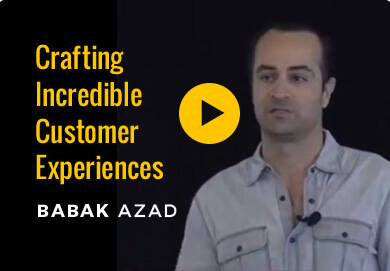
The best interview question I’ve ever asked…
“How would you find a needle in a haystack?”
I’ll come back to that in a second…
It’s no secret I’m a fan of making sure you have an analyst on your team. I harp on it so much not simply because it’s my background and I’m biased. The role provides real value to a business but seems to be one of the most overlooked ones.
One of the obstacles I’ve found from friends and clients is that they don’t know what exactly to look for. “Analyst” is a broad term and just because someone says they can run reports or knows how to use Excel doesn’t make them the right person for your company.
“I don’t know what I’ll even do with the reports when we get them”
If you’re reading this, that means you have the desire to improve your business. So trust me when I say that you and your team will quickly realize how much better you understand your business with reports (and I’m not even talking about hard-core analyses yet).
You’ll figure out how to use it.
I’ve built multiple high-performing analytics’ teams and have seen what works and what doesn’t.
To that end, below is a breakdown of what to look for and how to hire an analyst.
- Comp
- What Do I need in Place Before Hiring Somebody
- What to Screen For – Personality
- What to Screen For – Technical Skills
- What’s Not Required
- Red Flags
- What Additional Training to Provide
- What in particular to keep in mind with these roles
- Screening, Interview Questions and Assignments
- Sample Job Description
(Click on the links above to jump to that section)
Let’s get this out of the way first since those who haven’t hired an analyst before are worried about how much the role is going to cost them. (This, despite my strong feeling that the role will ROI very quickly and will become one of those you ask yourself how you did without.)
As with everything, the range depends on experience and where you are.
Here in Los Angeles, I’ve hired folks straight out of college for $45K-$50K and seen more experienced folks at $150K.
There are several factors that play into how senior you hire, but you don’t have to go big right off the bat. I’d say at $60K-$70K you should be able to get someone pretty decent, possibly a manager level.
What Do I Need in Place Before Hiring Somebody
Data integrity is the key to anything quantitative. It sounds obvious, but the reality is that most people don’t spend nearly as much time as necessary making sure their data is good. They think because they have an InfusionSoft integration or are using a high-end Oracle BI tool, that the data is good.
Or that they understand their data. Meaning, they assume their definition of something, like “sales”, is what the report is spitting out. When I was at Beachbody, I used to say that there were at least 5 different definitions of sales – Gross sales, shipped sales, net sales (after returns), wholesale, sales net of commissions – and so when someone described sales, we had to have a short conversation to make sure we were speaking the same language.
To that end, if you know your data is bad, plan on one of the first responsibilities for the analyst role to be to dig in to understand and work with IT to clean it up.
If you think your data is good, unless you’ve spent a ton of time cleaning it up, you probably are not aware of where the issues are. And you’ll need some clean-up. Just be prepared for some of this work to need to happen.
By the way, every organization has data integrity issues. Perfect data doesn’t exist. There is no company where you simply press a button and out comes a perfect report. Annoying? Yes. Relief to some who are frustrated with their issues? Sure. A reason to throw your hands up and do nothing? Absolutely not.
What to Screen For – Personality
- Intellectual Curiosity – one of the top 2 personal characteristics I think this role needs. It’s intellectual curiosity that drives someone to question, to dig in, to be frustrated by not understanding something and digging in even further. This role is all about curiosity.
- Attitude – probably the single most factor for success in any role. If this role is new to your organization, that means they are a guinea pig, so they need to know that. They also need to be able to persevere through bad data.
- Attention to detail – What the job is about. Here’s how I screen for this trait. At the beginning of the job description, write IN ALL CAPS to read the entire job description as it contains important info. And then halfway down the job description, ask candidates to put a specific word in the subject line. It’s the fastest way to filter out people, which is one of the biggest challenges in recruiting (just like knowing which hands to fold in poker).
- Comfortable with unclear goals / targets – Most of the time, you and they don’t know what you’re looking for. It might be, “Here’s a bunch of data. Tell me what you find.” Which is why those annoying consulting questions actually have some value. (My favorite question was, “How would you find a needle in a haystack.” See the bottom of this post for some of the best responses I’ve heard. You can answer for yourself before scrolling down.)
What to Screen For – Technical Skills
- Excel – an analyst who can’t navigate in Excel is essentially useless. See below for my test I used to give interview candidates. (One random question I’d also throw in would be to ask them what % zoom their Excel is in their current job – 100% is used by non-analysts, anyone doing anything meaningful is probably around 75%-85%. Geeky but true.)
- Microsoft Access – not a deal-killer for me. I didn’t learn Access for years and only a select few on my teams used it. A nice-to-have but if the individual knows Excel, they can figure out Access if necessary.
- Critical and analytical thinking – again, the core of what the role is about. In terms of resume screening, I look for something on the resume that indicates analytical ability – previous roles, engineering / math degrees, or perhaps a random but related hobby. But there has to be some base level of analytical ability. Training on the business versus training on the technical side are two completely different things. Personally, I don’t really care much about where they went to school – good candidates come from everywhere.
- Specific knowledge about your business or industry – clearly dependent on the role and your company, but if the individual is a smart analyst, they’ll figure out how to add value and dig in to your business pretty quickly. Don’t ding someone because they haven’t worked in your industry before.
- Management skills – analysts typically aren’t managers. And your first one or two don’t even need to have management potential. Focus on what they’ll be doing. Not what you might have them do in 3 years.
- The “Strategic” candidate – some candidates will say they are really interested in being strategic and want to help affect company strategy. To the point where you get tired of hearing the word. (Usually most prevalent in recent MBA grads – this from a Stanford guy so I’m mocking my own here…) The issue is that these folks don’t want to roll up their sleeves and live in Excel for a while. The bummer is they miss the point that everything is in the details. And that the more in the weeds they are, the better they will understand the business. And thus, the more strategic they can and would be.
- Complete inability to communicate – This role is admittedly a bit geeky. Okay, a lot geeky. Unlike some copywriters who can get away with being socially awkward introverts, analysts need to have decent communication skills. Or you need someone on the team who can communicate with them effectively. Copywriters at least have a communication style that works for them. Finding an analyst who can’t communicate in any medium is a disaster you need to avoid.
What Additional Training to Provide
- Technical – honestly, if you’ve screened correctly, there should be much technical training required initially. Over time, they may want or need some advanced Excel training or even Access and SQL.
- Communication – again, I would do this on day 1, but getting your analyst some communication and / or presentation training may not be a bad idea
- Books to read – “Made to Stick” by Chip and Dan Heath. One of my all-time favorite books. It’s about how to get ideas to stick. There are several sections that apply to people who go deep on something and then have to share their learnings – essentially what analysts have to do.
What in particular to keep in mind with these roles
- Most analysts are cerebral types, and as I mentioned above, likely introverts. As such, they may not always initiate issues and concerns. So you have to be more proactive in making sure they are doing okay.
- Take them to meetings – obvious to some, not so much to others. Analysts want to be appreciated and know that their work is of value. The best way is to be in a meeting where they are presenting their work or if they aren’t ready for prime-time, at least where their work is being discussed.
- Note, to the extent people start making decisions based on the reports, you’ll want the analyst in there anyways to make sure conclusions are correct. It’s also just smart to do so.
- Get them the fastest computers in the company and really nice monitors. Just do it. They’ll feel special. And it actually helps them be more efficient, especially the added processing power.
- Typically these folks like a quieter environment but unless you have a super raucous environment, I think it’s better to have them in the middle of things – they’ll learn faster through osmosis and will start sharing things real-time.
Screening, Interview Questions and Assignments
I have found that 3 different visits in-person works the best – the first is an initial screen of 25 minutes, the second is more extensive, and the third is really to make sure both parties do in fact like each other and feel there is a fit.
As mentioned above, one of the keys to the recruiting process is filtering out as many unqualified and frankly lazy applicants as quickly and efficiently as possible. That’s why, in the section above on “attention to detail”, I suggest having applicants put a specific word in the subject line of the email. Immediately, 30%-50% of the applicants will be filtered out. And using a rule in your mail provider, voila…
Next, I typically do an Excel test in a 2nd round interview (see link below), but you can do part or all of this remotely and have them email you the results. I wouldn’t worry about “cheating” because again, you’re looking to filter people out if they aren’t willing to make the effort. And then I would do an in-person test as well if you want.
The in-person interview questions really aren’t rocket science – it’s about trying to get a feel for the person, do they display a history of intellectual curiosity, do they have a good attitude, are they a cultural fit, etc. The Excel test is a big tool for filtering on real skill, plus it gives a candidate a sense of the type of work they’ll be doing.
In terms of questions, etc., here is a list of what I work through:
- The first question I ask every candidate in any role is what they like doing and want to be doing professionally. (If you don’t add “professionally”, you can set yourself up for legal issues – but professionally is fine.)
- I like broad questions initially because how someone answers tell you a lot about themselves.
- Obviously if they are straight out of college, I’d go with a “tell me about your favorite class or activity”
- This question can surprise many candidates because they are in “why I want this job” or “how do I impress this interviewer mode”
- The intent is actually to put people at ease so they can talk about themselves in a broader way
- What about what you’ve read or heard about this role is exciting to you?
- This is both to see what research they’ve done and to get a continued sense of their communication style. Plus, they better be talking about their desire to dig in to data to find stuff.
- Why do you think you would be good in this role?
- What kind of things do you read? Tell me about a book, article, etc. that you read recently that you really liked.
- These go to intellectual curiosity
- I’ll also throw in one of the consulting-type questions
- How would you find a needle in a haystack?
- Can you talk me through how you would go about estimating the number of gas stations in LA
- Note – I know many people find these annoying. But afterwards I’ll explain to candidates that the reason I ask them is because they are indicative of the work they’ll be doing. Sometimes it feels like you are actually trying to find a needle in a haystack. Sometimes you don’t have clear direction and so how they approach solving these questions gives a glimpse into how they think on their feet.
- How do you think about the next 12-18 months of your career
- I never liked 5 years out because who knows. But 12-18 months is manageable for most people.
- What other opportunities are you considering
- Somewhat obvious, but I like to know that people are looking at roughly similar roles elsewhere
Strategy Analyst (Note, I like adding Strategy in the title because it usually draws in a broader group, but if you know exactly what you’re looking for – a web analyst, marketing analyst, etc., use what you feel is best)
Description
This individual will be responsible for building reports and creating models and analyses to support the day-to-day decisions of the company.
The ideal candidate will not simply be a “number cruncher” but one who both wants to gain operational exposure and can think strategically beyond the basic work that needs to get done. Intellectual curiosity, analytical thinking, and a great attitude are keys to success in this role.
This individual in this unique position will learn about the inner workings of the Company and will become a provider of crucial information to help guide the company.
Primary Responsibilities
- Provide quantitative analysis to support the Company’s operating efforts
- Design reports to track financial metrics as well as operational metrics
- Create analyses using disparate data sources and large volumes of detailed data, often starting from scratch
- Translate the results of an analysis into easily understood presentation quality materials
- Provide input through business modeling and pro forma analyses to support strategic decision-making in day-to-day operations and new programs
- Proactively identify and evaluate strategic and operational opportunities and provide recommendations for potential solutions
- Provide regular reporting and analysis on key sales and marketing metrics, including sales force analytics, trends, etc.
- Perform exploratory data analyses that helps the company better understand the customer and present findings to both technical and non-technical audiences
Requirements
- 4-year degree in a related field
- Minimum of 2-3 years as an analyst in a finance environment / investment banking role
- MBA preferred but not required
- Excellent analytical skills
- Inquisitive mind with superior intellectual and quantitative analysis capabilities
- Strong proficiency with Excel
- Knowledge of Microsoft Access and SQL are a huge plus
- Ability to thrive in a new and unstructured position
- Ability to balance multiple projects at once
- Flexible team player who is looking to thrive in a fast-growing and often-times uncertain environment
- Excellent communication and interpersonal skills
- Self-starter with a willingness to take a hands-on approach to data analysis
Link to View and Download Interview File
My Favorite Answers to the Question:
“How would you find a needle in a haystack?”
- Best example of stopping to ask questions before you go on a goose chase: How big is the needle and how big is the haystack?
- 2nd best example of asking questions: What tools and resources do I have available to me to find the needle?
- Thinking unlike how most people think: I would send an email to the company or my team asking if anyone has solved this problem before (most people think they have to solve the problem entirely by themselves)
- Best example of a pyromaniac: I’d burn all the hay and then look thru what’s left to find the needle
- From a CEO: I would delegate to the CFO (exactly what the CEO is supposed to do)
- From my sister: How important is that specific needle, because if it’s not that important, I would just go to the store or amazon to get one
Please leave a comment below because I’d like to hear what you think.
You can also follow me on social media or connect with me directly by clicking the links to the left.






[…] last week’s post on how to hire an analyst, several people messaged me asking exactly what types of reports said […]